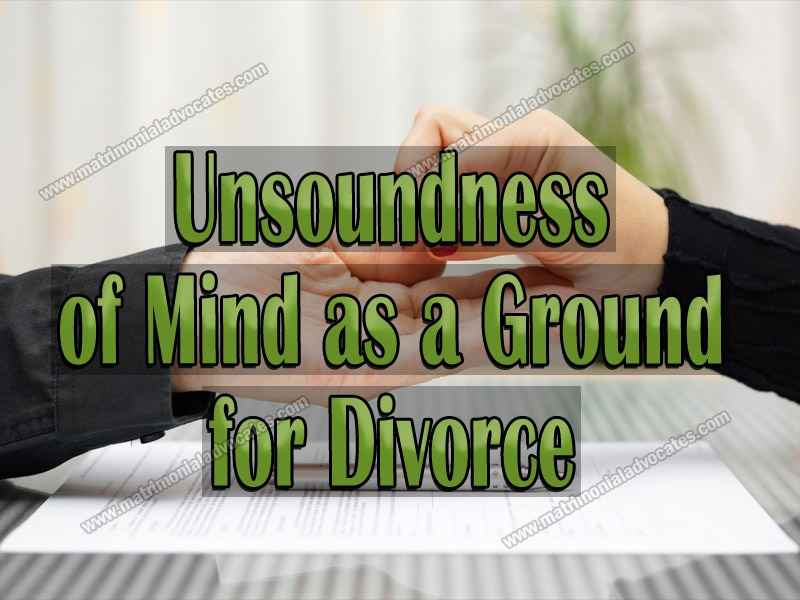
A decree to dissolve a marriage can be sought on the ground that the other spouse has been incurably of unsound mind, or has been suffering continuously or intermittently from a mental disorder of such a kind and to such an extent that the petitioner cannot reasonably be expected to live with the respondent.
The basic requirement under this section is that there should be a continuous suffering from disease to such an extent that the petitioner cannot reasonably be expected to fulfil his or her matrimonial obligations.
Degree of unsoundness of mind
It was reiterated in the case of Chinnan v. Prema that lunacy or mental illness does not include a person with borderline intelligence. The degree of unsoundness should be such that it renders such situations under which the spouse cannot reasonably be expected to live with the person. The presence of a single element from the statutory law is not sufficient to obtain a decree of divorce.
Test for determination
In order to ascertain, whether a person is of unsound mind, it is seen by the court if the concerned person can manage his or her own affairs as a reasonable person [Whysall v. Whysall]. Thus, a person who is of dull or weak intellect but who can understand the nature and consequences of his own actions such that they are able to control their own reactions and affairs, will not be a person of unsound mind in the eyes of law. However, if either of the spouses suffers from incurable epilepsy such that she cannot manage her own affairs, then the expression suffering incurably can be applied to her.
In R Lakshmi Narayan v. Santhi, the husband had filed for divorce after 25 days of marriage on the basis that his wife on the day of marriage had refused intercourse on the account of being drowsy. Consequently, husband came to know that the wife had been suffering from a disease since her childhood. The court, in this case, did not grant divorce on the ground contested by the petitioner.
Thus, mere scratching of the head or laughing in an irritating manner is not a mental disorder. Also, depression is not considered as a mental disorder.
In the case of Kollam Padma Latha v. Kollam Chandra Shekhar, the court ruled that if the wife is suffering from schizophrenia such that it is curable, then a petition for divorce under Section 13(1)(iii) is not maintainable in the court of law.
Burden of proof
Burden of proof in such cases falls on the petitioner to prove that his spouse if incurable of unsound mind or is suffering intermittently or permanently from such a mental disorder that it cannot be expected from the petitioner to stay with their spouse. The petitioner must prove
1. 1. His or her spouse is incurably of unsound mind, or,
2. 2. Suffering intermittently or permanently from a mental disorder
The burden has to be discharged by preponderance of probabilities failing which the suit would fail.
Mental condition of the spouse cannot be proved by a layman. It has to be proven by taking into consideration the opinion of a medical practitioner who has examined the person and can attest that the person falls under the provision of section 13(1)(iii) of the Hindu Marriage Act, 1955. However, the affected party can apply for re-examination by a different medical practitioner or psychiatrist which will be accepted by the court.
Therefore, in a case wherein a petition for divorce was instituted by the husband on the ground of unsoundness of mind of the wife and the husband had her examined by a professional psychiatrist who had been treating her for the past 25 years, an application for examination by a different psychiatrist was accepted by the court on the account that an allegation of unsoundness of mind is of serious nature and has bearing on the future of the affected party (N Rukmini v. Puttaswami).
- Hindu Marriage Act, 1955 s 13(1)(iii)
- I (2013) DMC 37 B (DB) (CN) Ker
- (1954) 3 All ER 359
- AIR 2001 SC 2110 (Mad).
- Hema Reddy v. Rakesh Reddy AIR 2002 AP 228
- AIR 2007 (NOC) 482 (AP)(DB).
- Thomus Titus v. Roja Titus AIR 1992 Ker 320
- AIR 2009 Kant 61.
Going through Matrimonial Issues! Need legal advice on 498A,
Divorce, Child Custody, Domestic Violence. We are providing a niche platform
for knowledge sharing, researching and finding an Advocate for a person who is
facing litigation and gives solution for all your legal queries. MatrimonialAdvocates.Com has
expert divorce lawyers across the country.
Disclaimer: These articles are providing only general information regarding Indian Laws and should not be construed as legal advice on any subject matter. Please speak to an Advocate to discuss your specific case.





